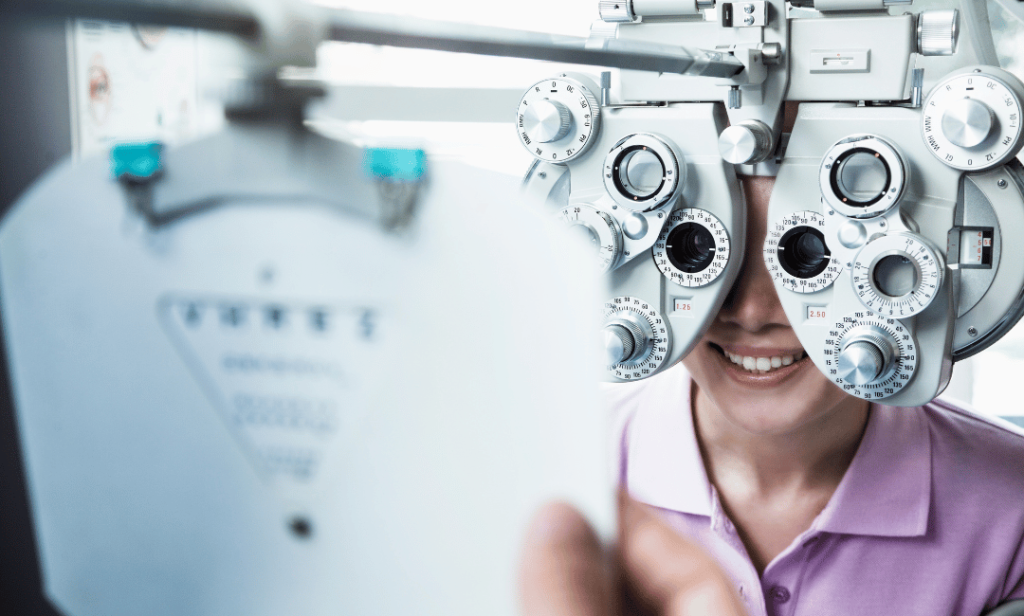The maintenance of clear eyesight and general eye health depends on proper eye care. Periodic eye examinations are one of the main elements of eye care. Everyone must obtain an eye checkup, regardless of whether they wear glasses or have never had any vision issues. If you are looking for an expert eye exam, feel free to contact Drs J&K Gill in Mississauga. Medical professionals are aware that patients need comprehensive eye exams, as well as frank counsel and sensible suggestions. They want to make sure you receive the responses to your inquiries regarding your eyes and eyesight as a priority. We will take you step-by-step through the full eye exam procedure in this detailed guide, explaining what to anticipate and the significance of each stage as we go.
The Measure Of The Ability To See
How well you see at different distances is determined by the visual acuity test. You will be required to read characters or numbers on a chart that is typically placed 20 feet away. This test can assist identify refractive defects including astigmatism, nearsightedness, or farsightedness. If you have vision problems, your doctor may recommend corrective procedures like glasses or contact lenses.
Examining Refraction
An eye care practitioner performs a refraction test to identify any refractive errors found during the visual acuity test and uses a phoropter to calculate the precise prescription required to correct those errors. The phoropter will be passed to you, and you will be asked to look through it and comment on which lenses you find to be the clearest. Your corrective lenses will be the most precise thanks to this method, which also helps to fine-tune the prescription.
Scheduling a Meeting
Booking a consultation with an optometrist or ophthalmologist is the first step in the eye exam procedure. Optometrists are basic eye care professionals with a focus on vision and eye health, whereas eye doctors are medical professionals with a focus on eye care, particularly the diagnosis and treatment of eye illnesses. According to your needs and tastes, you can select either option.
Inspection of the Eyes
The eye care specialist will conduct a thorough eye exam after evaluating your visual acuity and figuring out your prescription. Several significant tests are included in this exam, including:
Slit Lamp Inspection: With the aid of a specialized microscope known as a slit lamp, the eye doctor can use this test to look at the cornea, iris, and lens of your frontal eye. Conditions like cataracts, corneal damage, and conjunctivitis can all be found with this method.
Measuring Intraocular Pressure: A category of eye illnesses called glaucoma can cause high intraocular pressure, which can result in visual loss. A tonometer is used to measure the pressure; depending on the instrument, it may be contact or non-contact.
Examining the Fundus with Dilation: The retina, optic nerve, blood vessels, and other tissues at the back of your eye are examined during this process, which uses eye drops to stretch your pupils so the eye care specialist can see them. Conditions like macular degeneration, diabetic retinopathy, and retinal detachment are all found in this investigation.
Health Background And Signs
Your medical history and any current eye-related symptoms you may be having will be discussed with you by the eye care specialist before beginning your eye exam. If you have any existing medical illnesses, any drugs you are taking, or a family history of eye conditions, be sure to disclose them fully. The eye care specialist will be better able to assess your general health and spot any potential hazards with the use of this information.
Scripting and Monitoring
The eye doctor will give you a prescription if you need eyeglasses or contact lenses. They will go through the specifics of the prescription, such as the contact lens requirements or diopter strength. Next, use your prescription to choose frames or purchase contact lenses from an optical store. To monitor your eye health or treat any existing disorders, the eye doctor may also advise arranging routine follow-up visits.
Considerations and Advice
The eye care specialist will go through the results with you after the eye test is over. You will be given recommendations for preserving or enhancing your eye health once they have explained their findings, addressed any worries you might have, and provided advice. If any eye disorders or diseases were discovered, this could also include suggestions for lifestyle modifications, eye workouts, or other treatment alternatives.
Further Examinations
Additional tests could be conducted based on the results of the earlier tests or any particular worries. These examinations may include a visual field test to evaluate your peripheral vision, a color vision test to identify color blindness, or a pachymetry check to gauge the thickness of your cornea.
Wrapping Up
You may reduce your nervousness and make the most of your visit to an eye care specialist by being aware of the eye test procedure. You now have a greater grasp of each step involved, from the preliminary check-in through receiving your prescription or treatment plan, as a result of carefully reading this detailed guide. Keep in mind that routine eye exams are essential for retaining good eye health and clear vision, so be sure to prioritize them as part of your general healthcare regimen. To get expert Optometrists in Mississauga, you can go through Meadowvale Optometry. Here Dr Jag Gill and Dr Kuv Gill provide the best service to resolve eye problems in Mississauga. Contact them today to set your appointment with them.
